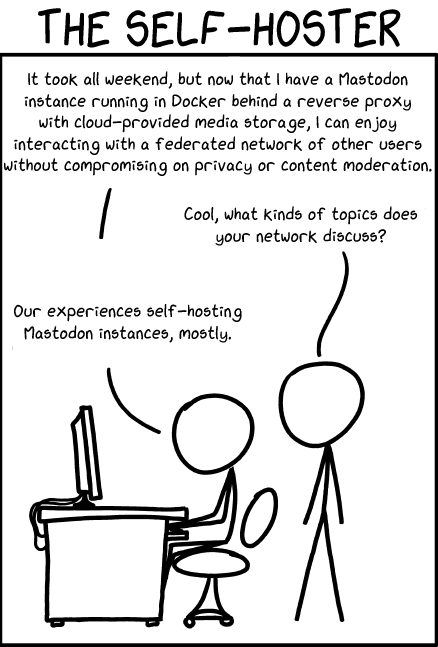Selfhosted
A place to share alternatives to popular online services that can be self-hosted without giving up privacy or locking you into a service you don't control.
Rules:
-
Be civil: we're here to support and learn from one another. Insults won't be tolerated. Flame wars are frowned upon.
-
No spam posting.
-
Posts have to be centered around self-hosting. There are other communities for discussing hardware or home computing. If it's not obvious why your post topic revolves around selfhosting, please include details to make it clear.
-
Don't duplicate the full text of your blog or github here. Just post the link for folks to click.
-
Submission headline should match the article title (don’t cherry-pick information from the title to fit your agenda).
-
No trolling.
Resources:
- selfh.st Newsletter and index of selfhosted software and apps
- awesome-selfhosted software
- awesome-sysadmin resources
- Self-Hosted Podcast from Jupiter Broadcasting
Any issues on the community? Report it using the report flag.
Questions? DM the mods!
view the rest of the comments

I don’t like the use of the word cloud, makes it sound like some mystical virtual environment in the sky that anyone can use and it just works.
It’s someone else’s computer, nothing more
I broadly agree that "cloud" has an awful lot of marketing fluff to it, as with many previous buzzwords in information technology.
However, I also think that there was legitimately a shift from a point in time where one got a physical box assigned to them to the point where VPSes started being a thing to something like AWS. A user really did become increasingly-decoupled from the actual physical hardware.
With a physical server, I care about the actual physical aspects of the machine.
With a VPS, I still have "a VPS". It's virtualized, yeah, but I don't normally deal with them dynamically.
With something like AWS, I'm thinking more in terms of spinning up and spinning down instances when needed.
I think that it's reasonable to want to describe that increasing abstraction in some way.
Is it a fundamental game-changer? In general, I don't think so. But was there a shift? Yeah, I think so.
And there might legitimately be some companies for which that is a game-changer, where the cost-efficiencies of being able to scale up dynamically to handle peak load on a service are so important that it permits their service to be viable at all.